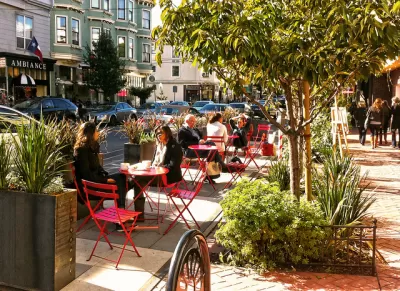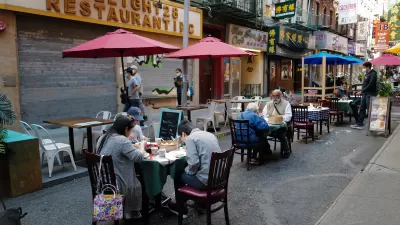Small-scale interventions can lead the way to major parking reforms.

Is your community ready for Parking Season?
For over a decade, urban activists around the world have celebrated Park(ing) Day on September 20, marking a day when urbanists demonstrate new uses for parking spots and take the opportunity to propose more effective parking policies.
As Carlee Alm-LaBar explains in a piece for Strong Towns, “One powerful way for cities to increase their resilience and productivity is to abolish parking minimums. For local heroes, embracing this challenge often involves taking small steps before reaching the final goal.” This year more than ever, the movement toward parking reform is growing in small and big cities alike.
Alm-LaBar uses an example from Lafayette, Louisiana to illustrate how temporary, low-cost installations can lead to permanent change. “The city worked with a nonprofit organization — ReCover Acadiana (now Civicside) — to host Park(ing) Day in 2017. That first year, it had 16 temporary installations in Downtown Lafayette. They were works of architecture, museum-inspired installations, a temporary fountain and a simple installation that foreshadowed enjoying a dining experience outdoors.” Less than a year later, the city began permitting parklets and outdoor dining spaces in former parking spots.
FULL STORY: How To Use Parking Season To Make Your Community Stronger

Trump Administration Could Effectively End Housing Voucher Program
Federal officials are eyeing major cuts to the Section 8 program that helps millions of low-income households pay rent.

Planetizen Federal Action Tracker
A weekly monitor of how Trump’s orders and actions are impacting planners and planning in America.

Ken Jennings Launches Transit Web Series
The Jeopardy champ wants you to ride public transit.

Crime Continues to Drop on Philly, San Francisco Transit Systems
SEPTA and BART both saw significant declines in violent crime in the first quarter of 2025.

How South LA Green Spaces Power Community Health and Hope
Green spaces like South L.A. Wetlands Park are helping South Los Angeles residents promote healthy lifestyles, build community, and advocate for improvements that reflect local needs in historically underserved neighborhoods.

Sacramento Plans ‘Quick-Build’ Road Safety Projects
The city wants to accelerate small-scale safety improvements that use low-cost equipment to make an impact at dangerous intersections.
Urban Design for Planners 1: Software Tools
This six-course series explores essential urban design concepts using open source software and equips planners with the tools they need to participate fully in the urban design process.
Planning for Universal Design
Learn the tools for implementing Universal Design in planning regulations.
Heyer Gruel & Associates PA
Ada County Highway District
Institute for Housing and Urban Development Studies (IHS)
City of Grandview
Harvard GSD Executive Education
Toledo-Lucas County Plan Commissions
Salt Lake City
NYU Wagner Graduate School of Public Service





























